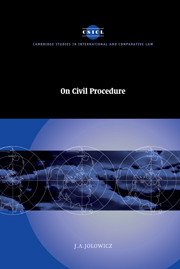Book contents
- Frontmatter
- Contents
- Preface
- List of abbreviations
- Introduction
- I The litigation process
- II Protection of diffuse, fragmented and collective interests
- III Procedural modes
- IV The parties and the judge
- V Recourse against judgments
- VI Procedural reform
- 17 ‘General ideas’ and the reform of civil procedure
- 18 Reform of English civil procedure: a derogation from the adversary system?
- 19 The Woolf reforms
- Index
- CAMBRIDGE STUIDES IN INTERNATIONAL AND COMPARATIVE LAW
17 - ‘General ideas’ and the reform of civil procedure
from VI - Procedural reform
Published online by Cambridge University Press: 18 December 2009
- Frontmatter
- Contents
- Preface
- List of abbreviations
- Introduction
- I The litigation process
- II Protection of diffuse, fragmented and collective interests
- III Procedural modes
- IV The parties and the judge
- V Recourse against judgments
- VI Procedural reform
- 17 ‘General ideas’ and the reform of civil procedure
- 18 Reform of English civil procedure: a derogation from the adversary system?
- 19 The Woolf reforms
- Index
- CAMBRIDGE STUIDES IN INTERNATIONAL AND COMPARATIVE LAW
Summary
The Royal Commission on Legal Services, which reported in 1979, was not called upon to review procedure or the administration of justice. It nevertheless received so much evidence on these subjects that it saw fit to publish a summary of that evidence and to recommend that ‘a full appraisal of procedure and the operation in practice of our system of justice, in particular in all civil courts’ should be carried out. Since then, extra urgency has been given to the reform of civil procedure, both generally and in some of its more specialised aspects, and in 1985 the then Lord Chancellor set up the Civil Justice Review which, after wide consultation, produced its Report in 1988. Following on that, numerous changes of practice in the High Court and the Court of Appeal were introduced by legislation, by Practice Direction and simply by change in judicial practice. Even this was not enough, however, and in 1994 the Lord Chancellor appointed Lord Woolf to review the rules and procedures of the civil courts with a view, principally, to improvement in ‘access to justice’.
It is unnecessary to look further for evidence of continuing dissatisfaction with the administration of justice in England; it appears that when Pound said, in 1906, that ’dissatisfaction with the administration of justice is as old as law’, he could have added ‘and will continue until law ceases to exist’.
- Type
- Chapter
- Information
- On Civil Procedure , pp. 355 - 372Publisher: Cambridge University PressPrint publication year: 2000



